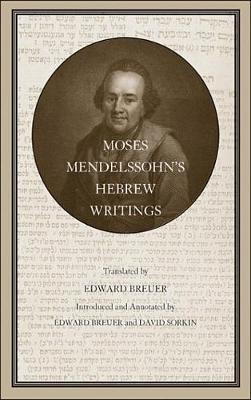Yale Judaica
1 primary work
Book 33
German Jewish philosopher Moses Mendelssohn (1729-1786) was one of the most influential thinkers of the Enlightenment. Until now, attention was focused on Mendelssohn's German works-such as his groundbreaking Jerusalem-which have been duly translated into English. Edward Breuer and David Sorkin assert that his Hebrew works are essential for understanding both his biography and his oeuvre. This volume offers expertly translated and generously annotated selections from the entire corpus of Mendelssohn's published Hebrew writings.
Mendelssohn wrote in Hebrew throughout his life, but these works-mainly grounded in biblical and other Hebrew classical works-have been hitherto inaccessible to most scholars. In this volume, Breuer and Sorkin make an important contribution to modern Jewish and religious thought, refuting the notion that Mendelssohn led a bifurcated intellectual and spiritual existence and demonstrating Mendelssohn's ability to transform traditional religious genres into vehicles for philosophical argumentation.
Mendelssohn wrote in Hebrew throughout his life, but these works-mainly grounded in biblical and other Hebrew classical works-have been hitherto inaccessible to most scholars. In this volume, Breuer and Sorkin make an important contribution to modern Jewish and religious thought, refuting the notion that Mendelssohn led a bifurcated intellectual and spiritual existence and demonstrating Mendelssohn's ability to transform traditional religious genres into vehicles for philosophical argumentation.
